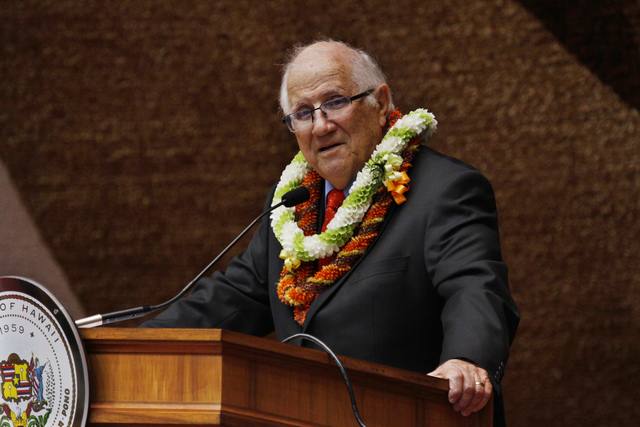In his long career in Hawaii politics, Democratic House Speaker Joe Souki has risen to power, been ousted, and then engineered a deal to get that power back. At 85, he still commands respect, and he isn’t ready to walk away yet.
Both Souki’s supporters and critics say he has firmly locked down all the votes he needs to remain as speaker for the next two years, quietly gathering that support with his allies even before lawmakers adjourned the last session in May.
Collecting firm political commitments that early effectively left no room for any would-be House dissidents to challenge Souki’s authority regardless of the outcome of the primary or general elections.
The House is also expected to retain much of the rest of its top leadership, including House Finance Chairwoman Sylvia Luke and House Majority Leader Scott Saiki.
Luke said the current House leadership initially agreed Souki would hold the speaker’s job for four years, and that four years has now expired. However, “Scott and I made it very clear to Joe that as long as he wants to be speaker, we’re committed to him because this was a mutual relationship, and we like working with each other,” she said.
At the close of the 2016 session, Saiki and Luke helped gather signatures in support of Souki on a petition that committed the House Democrats to retain him as speaker for the next biennium, and each of the Democrats who won their primary races on Aug. 13 have already signed that document, Luke said.
Assuming the Democrats remain true to that commitment — and they are expected to do so — there is no one left to buck the existing House organization. Republicans hold just seven seats in the 51-member House, and they are not expected to significantly expand their numbers this year.
“I look forward to serving the House again, and I thank the House members for having faith and confidence in me,” Souki said in an interview Saturday.
Souki (D, Waiehu- Wailuku) said it is premature to discuss what policy agenda he hopes to pursue in the two years ahead. He said that discussion should wait until after the November election, when Souki faces Republican Gil Rebolledo in the general election.
However, Souki tends to be outspoken about his views, and he has already taken public positions on two key issues that lawmakers are certain to consider next year.
Souki supports another extension of the half-percent excise tax on Oahu to provide additional funding to complete the over-budget $8.1 billion Honolulu rail project, and also supports proposals by Gov. David Ige to increase the state’s gas tax, weight tax and vehicle registration fee to provide more money for highway construction and maintenance.
However, that does not necessarily mean all House Democrats will support those additional taxes. Some, such as House Vice Speaker John Mizuno, flatly oppose them, and Luke and Saiki did not respond to candidate questionnaires seeking their views on those tax proposals. However, Souki’s voice in support of those controversial proposals will carry weight.
Souki has served in the Legislature since 1982, and was first elected House speaker by the ruling Democrats in 1993. He held that job until 1999, when a coup led by then-House Finance Committee Chairman Calvin Say removed him.
Souki then served in less influential positions in the House for the next 13 years until a new coalition formed to overturn Say’s organization, and returned Souki to the speaker’s post in 2013.

